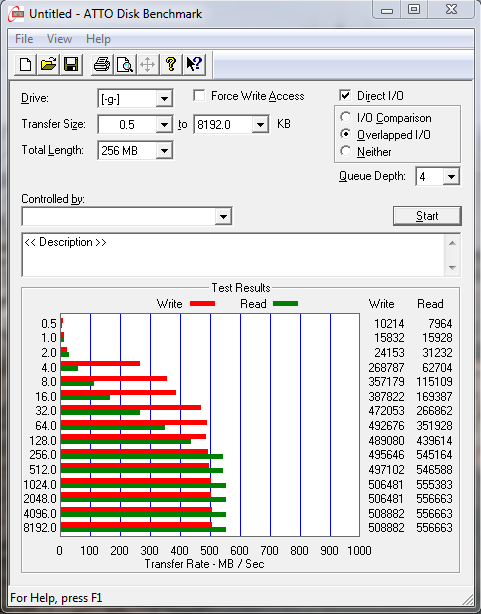ATTO Disk Benchmark is perhaps one of the oldest benchmarks going and is definitely the main staple for manufacturer performance specifications. ATTO uses RAW or compressible data and, for our benchmarks, we use a set length of 256mb and test both the read and write performance of various transfer sizes ranging from 0.5 to 8192kb. Manufacturers prefer this method of testing as it deals with raw (compressible) data rather than random (includes incompressible data) which, although more realistic, results in lower performance results.

 You can click on any of our photos or benchmarks to get a high definition and clearer shot. Looking at both Neutron ATTO results, we see very high write results starting as low as the 4k level which is something we don’t often see. ATTO results of 556MB/s read and 508MB/s write for the GTX and 555MB/s read and 371MB/s write for the Neutron are as close to specifications as one can ask.
You can click on any of our photos or benchmarks to get a high definition and clearer shot. Looking at both Neutron ATTO results, we see very high write results starting as low as the 4k level which is something we don’t often see. ATTO results of 556MB/s read and 508MB/s write for the GTX and 555MB/s read and 371MB/s write for the Neutron are as close to specifications as one can ask.
CRYSTAL DISK BENCHMARK VER. 3.0 X64
Crystal Disk Benchmark is used to measure read and write performance through sampling of raw (0/1 Fill/compressible) or random data which is, for the most part, incompressible. We tested in both compressible and incompressible samples and the results were vitrually identical. For our purposes, we will use random, or highly incompressible data samples, again with the GTX on the left and neutron on the right.

 Results drop a bit in comparison to ATTO testing which is typical of Crystal Disk Mark and a quick look at the high sequential and 512k write performance of both starts to show us how quality of NAND flash memory can make a difference. Something great to see in both is the very high 4k random write results as well as the high performance in upper queue depths. This was totally unexpected for a new controller to the market.
Results drop a bit in comparison to ATTO testing which is typical of Crystal Disk Mark and a quick look at the high sequential and 512k write performance of both starts to show us how quality of NAND flash memory can make a difference. Something great to see in both is the very high 4k random write results as well as the high performance in upper queue depths. This was totally unexpected for a new controller to the market.
Up until recently, AS SSD was the only benchmark created specifically for SSD testing and it uses incompressible data. AS SSD, for the most part, gives us the ‘worst case scenario’ in SSD transfer speeds because of its use of incompressible data and many enthusiasts like to AS SSD for their needs.

 I don’t think we have seen an AS SSD high sequential write benchmark as high as 474MB/s until this test on the right. We also don’t typically rely on the final scoring but very few SSDs we have tested to date have broken 1000 points and, in the case of both Neutron SSDs, the lightning fast access times play a key role in these final score totals..
I don’t think we have seen an AS SSD high sequential write benchmark as high as 474MB/s until this test on the right. We also don’t typically rely on the final scoring but very few SSDs we have tested to date have broken 1000 points and, in the case of both Neutron SSDs, the lightning fast access times play a key role in these final score totals..
 The SSD Review The Worlds Dedicated SSD Education and Review Resource |
The SSD Review The Worlds Dedicated SSD Education and Review Resource | 
Glad to see another SSD controller apart from Marvell that doesn’t flop under incompressable data like Sandforce does.
My next SSD will likely be a 512GB. As soon as the prices come down to $400.
some crucial m4 and sandisk 512/480gb ssd already went to 389 and 359.
the prices are 399.99 and less for some good ones
Today you can get a Crucial M4 right here at the forum store for 349.00 ,512gb.
Superb review and great shoot on picture 🙂
Great review. Thanks so much! Will look to budget one of these into my next build.
Nice review indeed.
Only one thing>they are not sata 6,else perfect 🙂
all tests are to simple for me. You did not write if neutron caches data in DRAM, what happen if power ist lost. how disk will work in real world not just brand new out of the box?
look to storagereview or anandtech tests. they try to look deeper into the subject.
not all users are buing ssd to test how fast it can write one big file to laptop. many people uses SSD as smart cache for HHDs. are neutrons good for that?